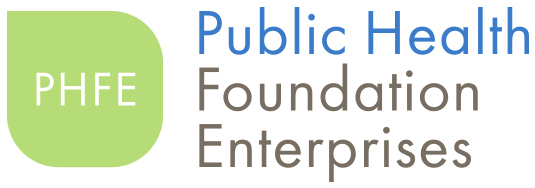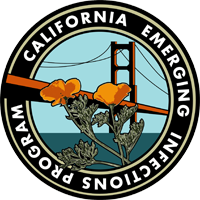November 19, 2013 8:30 am to 1:00 pm
Elihu Harris State Office Building
1515 Clay Street
Oakland, CA 94612
in the main auditorium
Please join us for our 13th annual symposium, Under Surveillance 2013: Emerging Infections in California. Presentation topics include emerging respiratory viruses, electronic communicable disease reporting, Valley Fever, and an update on HPV. This FREE event is designed for laboratorians, infection control practitioners, public health professionals, and nurses.
Seminar Overview
The California Emerging Infections Program is in its nineteenth year of conducting active surveillance for selected pathogens and related studies in the San Francisco Bay Area. The CEIP would like to take this opportunity to thank its many partners in clinical laboratories, infection control departments, local health departments, and the California Department of Public Health for their past and continued support and collaborative efforts.
This seminar will highlight recent emerging infectious diseases and issues in the San Francisco Bay Area, including those under surveillance by CEIP.
Faculty
Julie Vaishampayan, MD, MPH
Dr. Vaishampayan is Chief of the Communicable Disease Emergency Response Branch, Division of Communicable Disease Control, at the California Department of Public Health and an Infection Control Consultant for Sutter Tracy Community Hospital.
James Watt, MD, MPH
Dr. Watt is Chief of the Division of Communicable Disease Control, Center for Infectious Diseases, at the California Department of Public Health. He also serves as a Director of the California Emerging Infections Program and is a Principal Investigator for the Centers for Disease Control and Prevention. Dr. Watt is an adjunct faculty member at Johns Hopkins and serves as an Associate Clinical Professor at the University of California, San Francisco School of Medicine.
Lauren Lee, MD, MPH
Dr. Lee is a Medical Epidemiologist for the Infectious Diseases Branch of the California Department of Public Health. Previously she was FoodNet Epidemiologist at the California Emerging Infections Program.
Ina Park, MD, MS
Dr. Park is Chief of the Office of Medical and Scientific Affairs, STD Control Branch, at the California Department of Public Health. She is also Adjunct Assistant Professor at the University of California San Francisco School of Medicine’s Department of Family and Community Medicine and Medical Director at the California STD/HIV Prevention Training Center.
Continuing Education
This intermediate-level seminar is designed for laboratorians, infection control practitioners, public health professionals, and nurses.
Three (3.0) hours of CEUs for laboratorians are provided by Kaiser Permanente Northern California Regional Laboratory Accrediting Agency #0013, as approved by California State Department of Public Health, Laboratory Field Services Branch.
BRN CEUs are provided by Contra Costa Health Services. Continuing education units will be offered based on three (3.0) hours of instruction.
Schedule
8:30am – Registration
9:00am – Welcome and Opening Remarks
Gretchen Rothrock, MPH
CEIP Health Program Manager
9:10am – Emerging Respiratory Viruses: Avian Influenza A (H7N9), Influenza A (H3N2v), and MERS-CoV
Julie Vaishampayan, MD, MPH
Chief, Communicable Disease Emergency Response Branch
Division of Communicable Disease Control
California Department of Public Health
10:00am – Electronic Laboratory Reporting, Health Information Technology, and the Future of Communicable Disease Reporting
James Watt, MD, MPH
Chief, Division of Communicable Disease Control, Center for Infectious Diseases
California Department of Public Health
Director, California Emerging Infections Program
10:45am – Break
11:15am – Valley Fever
Lauren Lee, MD, MPH
Medical Epidemiologist, Infectious Diseases Branch
California Department of Public Health
12:00pm – Update: Human papillomavirus
Ina Park, MD, MS
Chief, Office of Medical and Scientific Affairs, STD Control Branch
California Department of Public Health
12:15pm – Question & Answer Session
12:45pm – Evaluation
1:00pm – Adjourn
Learning Objectives
- Understand the epidemiological characteristics of Avian Influenza A (H7N9), Influenza A (H3N2v), and MERS-CoV
- Understand the role of the medical community for early detection of emerging viruses
- Understand the surveillance and response roles of local, state, and federal public health jurisdictions
- Describe the major components of the communicable disease surveillance system in California
- Name two major challenges with electronic information exchange
- Name two ways in which electronic information exchange can improve communicable disease surveillance
- Summarize the recent epidemiology of coccidioidomycosis in California
- Describe the populations at increased risk for hospitalization with coccidioidomycosis and the associated costs in California
- Describe strategies for preventing coccidioidomycosis infection
- Describe recommendations for HPV vaccination among males and females in the US
- Describe the impact of HPV vaccination on genital wart outcomes in Australia and the US
- Describe recent trends in HPV vaccination among adolescent boys and girls in the US
CEIP extends its most sincere gratitude to the laboratorians and infection control practitioners at its participating hospitals as well as our collaborators at Contra Costa Health Services, San Francisco Department of Public Health, Alameda County Health Department, and the Health and Human Services Department at the City of Berkeley for their continuing support of CEIP’s surveillance efforts.
CEIP is funded by the Centers for Disease Control and Prevention. Fiscal sponsorship is provided by Public Health Foundation Enterprises, Inc. (PHFE).





The California Emerging Infections Program is a project of Public Health Foundation Enterprises. Funding for this conference was made possible by Cooperative Agreement #CI-000309 from the Centers for Disease Control and Prevention (CDC). The views expressed in written conference materials or publications and by speakers and moderators do not necessarily reflect the official policies of the Department of Health and Human Services; nor does mention of trade names, commercial practices, or organizations imply endorsement by the US Government.
We are happy to accommodate participants with special needs. In compliance with the Americans with Disabilities Act, please notify CEIP at least two weeks prior to the seminar by calling 510.350.3362.
